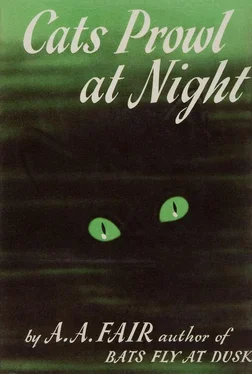“Stand there until I get some clothes on,” Bertha snapped.
She retired to her dressing-room, rubbing herself into a glow with the coarse towel.
Sergeant Sellers kept up a steady, monotonous pounding on the door.
Bertha stood it as long as she could, then she flung a robe around her, went to the door and jerked it open. “Just because you’re the law,” she stormed, “you think you can bust in on anybody at any time. Go right ahead, wake people up in the middle of the night.”
“It’s quarter-past nine,” Sellers said, grinning at Bertha and walking nonchalantly into the apartment.
Bertha kicked the door shut and regarded him sourly. “You might just as well leave your badge at home,” she said. “Anybody can tell you’re a cop, walking into a woman’s apartment while she’s dressing, keeping your hat on, smoking a soggy cigar, stinking up the apartment before I’ve had my breakfast.”
Sergeant Sellers grinned again. “You’d get my goat, Bertha, if it weren’t for the fact that I know you have a heart of gold under that hard-boiled exterior. When I think of what you did in that blind man’s case, I feel that I should buy you a drink every time I see you.”
“Oh, hell,” Bertha snorted. “What’s the use. I can’t even get under your damned thick hide. Sit down and read the newspaper, but for God’s sake throw that stinking stogie out of the window. I’ll brush my teeth and—”
Sergeant Sellers held a match to the cold, soggy cigar, tilted his hat back, said, “I’ve seen the newspaper, and never mind your teeth. What do you know about Mrs. Everett Belder?”
“What’s it to you?” Bertha demanded, instantly alert with suspicion.
“Seems to be a sloppy housekeeper,” Sellers said.
“Yes?”
“That’s right. Goes away and leaves bodies in her basement and forgets to come back.”
“What are you talking about?”
“A body in Mrs. Everett Belder’s cellar.”
Bertha Cool became as wary as a veteran trout in a deep mountain pool watching a fly being flicked over the surface of the water. “Who did she kill, her husband?”
“I didn’t say she killed anyone. I said she left bodies in her basement.”
“Oh,” Bertha said. “I thought you meant she killed someone.”
“No. I haven’t said that — not yet.”
“Then there’s nothing for me to get concerned about.”
“I take it you want to be of every assistance to the police.”
“Why should I?”
“Because you’d like to stay in business.”
“Sure,” Bertha said, her eyes watching Sellers’ face for any tell-tale flicker of expression. “I’ll help the police clean up a murder case, but I see no reason to get steamed up over the fact that the woman’s a sloppy housekeeper. How many bodies?”
“Only one.”
“Give her a chance. You shouldn’t accuse her of being a sloppy housekeeper on the strength of one body. I’ve read of cases where people have had as many as a dozen; and then again, if it hadn’t been there too long, it might mean she merely—”
Sellers chuckled. “You aren’t kidding anybody, least of all, me.”
“Perhaps I’m kidding me.”
“Go ahead then.”
“Then quit interrupting.”
“When you quit stalling around, we’ll get down to brass tacks.”
“Who’s stalling?”
“You are.”
“Why should I stall?”
“Damned if I know,” Sellers said cheerfully. “It’s just a habit you have. Whenever the going gets tough and someone tries to pin you down, you get as elusive as the cherry in a cocktail.”
“You’re the one that’s stalling. Who’s the corpse?”
“The name’s Sally Brentner, a young woman of twenty-six or so.”
“How did she die?”
“We don’t know yet.”
“Natural death?”
“Well, it might have been an accident.”
“And then again?” Bertha said.
“And then again, it might not.”
“ You’re a big help, aren’t you?”
“It’s mutual.”
“Just who is this Sally Brentner?”
“A maid in the place.”
“How long has the body been there?”
“A day or so.”
“In the cellar?”
“That’s right.”
Bertha made her voice sound elaborately casual. “What does Mrs. Belder have to say about all this?”
“Nothing.”
“You mean she won’t answer questions?”
“She doesn’t seem to be available for questioning. She seems to have left. That’s where you come in.”
“What do you mean?”
“I understand that when she was last seen, you were the one that was doing the looking.”
“Who told you that?”
“A little bird.”
The telephone started ringing again. Bertha welcomed the interruption.
“Just a minute,” she said to Sergeant Sellers, and then, picking up the telephone, said, “Hello.”
Everett Belder’s voice showed that he was under great emotional stress. “Thank heavens I’ve located you! I’ve been calling you everywhere. I called your apartment before and you didn’t answer. Your secretary gave me the number—”
“All right,” Bertha interrupted, “get it off your chest.”
“Something terrible has happened.”
“I know.”
“No, no. This is in addition to all my other troubles. They’ve found Sally’s body in the basement. She’s been—”
“I know,” Bertha said. “The police are here.”
There was dismay in Belder’s voice. “I wanted to get you before they got there. What have you told them?”
“Nothing.”
“They’re there with you now?”
“Yes.”
“And you’ve told them nothing?”
“That’s right.”
“Can you get away with that?”
“I don’t think so. Not for long. Is your wife home?”
“No, she didn’t show up all night. My mother-in-law was frantic. That’s how it happened the body was discovered. She swore she was going to search every room in the house. She said she’d start with the cellar. I heard her going down the cellar steps, then she screamed and fainted. I rushed down after her, and Sally was lying all sprawled out—”
Sergeant Sellers interrupted good-naturedly. “I’m giving you a lot of rope, Bertha. Don’t try to tie any fancy knots or you might get tangled up.”
“Was that the law saying something?” Belder asked.
“Yes,” Bertha commented tersely, and stopped there.
Belder said, “I told the officers someone had written a poison-pen letter to my wife. I told them I couldn’t show it to them because you had it. I didn’t tell them specifically why I’d employed you. Just gave them the general picture and skirted around the whole situation very lightly.”
“I see.”
“Now I think we’ve got to show the officers that first letter, Mrs. Cool. It may be connected with Sally’s death. It’s just possible it might have something to do with the case; but that second letter, the one we opened last night, that doesn’t have anything at all to do with the case, and I don’t want the police to know anything about it.”
“Why?”
“Because I don’t want Dolly Cornish dragged into this.”
“Why?”
“I tell you I don’t want Dolly dragged into it. I don’t want a lot of notoriety for her. That letter makes things sound pretty bad.”
“Why?”
“Can’t you understand? There are a lot of angles to this thing. The police might make things unpleasant for Mrs. Cornish.”
“Why?”
“My God, can’t you get the picture? My wife probably— We’ll have to protect Dolly?”
“Why?”
“Damn it, can’t you say anything at all except ‘why’?”
Читать дальше











